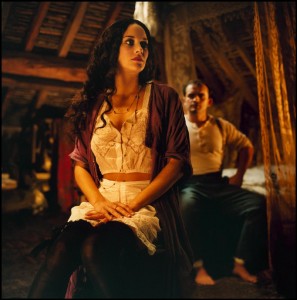A Very Long Engagement – Magical realism, love in war

magically real
![]()
![]()
![]()
A Very Long Engagement – Director Jean-Pierre Jeunet
A Very Long Engagement is a great read. The film I mean, I haven’t read the book. It is not so much a film of a book as what one might call a ‘book-film’. I have never seen a film which more recalled the experience of reading a book. It has a chapter-like structure and a steady, page-turning pace and visual quality that takes a while to adjust to. In cinematic terms this makes the narrative slow to develop, too slow at times, certainly for our modern film-savvy expectations. Even the use of a narrator, common in films of books as a plot-driver, is here used languidly, simply to reveal the inner feelings of the characters, very much in the descriptive passage style of a novel. Many will justifiably, get impatient, but I found it began to draw me in and engage me rather like a book whose early chapters seem unpromising but eventually makes you care about the characters and wonder what happens next.
So why a film? Well its visual style, typically with Jeunet, echoing Amelie, is non-naturalistic in colour and tone. The obvious magical realism segments strike one as more contrived and intrusive to this film’s period lyrical style than with the animated modern Paris setting of Amelie. And of course no printed words could do justice to the irresistible gamin vulnerability of Audrey Tautou: though a third film living off this screen persona, however captivating, would be a stretch. Her quirky, eccentric style works well again here to maintain the non-naturalistic tone of the film, but she needs to be given a bit more to do. It also irritates many: I have heard it said that you really have to be in the mood to ‘buy into’ Amelie.
Jeunet’s treatment of this romantic story of inextinguishable hope wrapped in an unfolding mystery, is idiosyncratic and always interesting even if, as must be admitted, it lacks pace or cadence. Given the demand of the narrative to juxtapose the gritty, appalling realism of trench warfare, with the lyrical romance of childhood sweethearts turned naïve lovers, separated by war, Jeunet’s non-naturalistic style shows good aesthetic judgement. In unreal times, even the earthy reality of love must take on an air of detachment and strangeness. So we have a melange of styles from the gritty realism of the trenches to surrealistic shots of Mathilde playing her euphonium (I think) on the cliffs like a siren calling her lover to shore. Indeed a delightful running gag about the postman churning up the gravel of her father’s drive is almost Ealing comedy English in style.
The downside of this mixture of styles is that it distances us from the emotional core of the movie. It makes the ending less powerfully affecting. In the end it disappoints. A little. But this film’s quiet, mild disappointment is worth more than the brash urgency of lesser work. Throughout A Very Long Engagement there is an enduring, satisfying, tenderness, which is a rare enough emotion in modern movies to be cherished.
(March 2005)
Filed under: 3 star, Drama, Europe/World cinema, General, Jean-Pierre Jeunet, Romance, War

